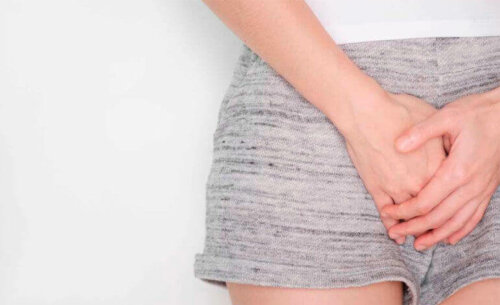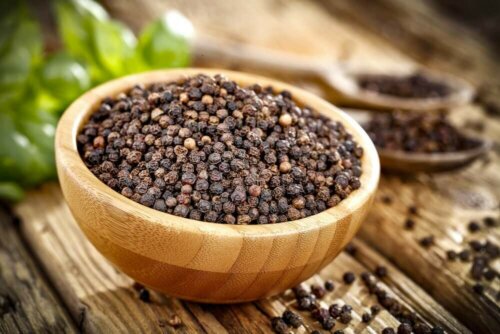Natural Remedies to Fight Vaginal Boils

Vaginal boils are bothersome, painful, and can lead to complicated infections. Thus, you should know more about them and why they occur.
Does this condition afflict you? We’ll also share several natural remedies that may help promote relief.
What are vaginal boils?
Hair follicle inflammation affects the subcutaneous tissue and the dermis. As a result, a type of “pimple” appears that’s both painful and very bothersome. This infection occurs at the root of body hair. The matter that’s produced doesn’t allow the hair to leave the skin.

Common causes of vaginal boils
These boils are mostly caused by clogged hair follicles that force hair to grow sideways. Hair removal may be related to these episodes that don’t involve health risks. In fact, it may be enough to simply exfoliate your skin periodically.
Vaginal boils are also associated with infection by the bacteria Staphylococcus aureus or by the action of fungi or yeast. This is called fungal folliculitis, and it’s contagious. Tight underwear can also make this condition appear, as can poor hygiene.
Boils can appear around the labia and on the vulva. They’re also very common on the neck and face, as well as the buttocks and thighs. Likewise, the armpits and hairy and moist areas are susceptible to their appearance.
If a hair can’t grow upwards and the hair follicle clogs up, we advise pouring warm water around the affected area, disinfecting it, and trying to remove it from the inside of the follicle. It’s a very simple process.
Read on to learn more: The Characteristics of Genital Pimples and Its Causes
When does a boil pose a risk?
You should consult a doctor if the ingrown hair changes color, increases its size, or causes discomfort and fever. If it doesn’t go away after a week, it may pose a risk.
A vaginal boil in these conditions can be indicative of the presence of the human immunodeficiency virus (HIV). Cutaneous myiasis or furuncular myiasis, a parasitic skin infection, is another possibility. Diabetes, especially Mellitus, can cause them as well.
Boils can also be indicative of kidney failure, cirrhosis, skin diseases, obesity, poor personal hygiene, and aging. In these cases, it’s important for you to visit your doctor. They’ll be able to detect if it’s an uncontrolled infection or the consequence of a disease.
Natural remedies to treat vaginal boils
Several natural remedies can help treat folliculitis. They’re complementary and don’t replace medical treatment if you require it. In many cases, just putting warm water around the boil may help dry it quickly.
Antiseptic black pepper
Black pepper is very useful. It’s an antiseptic and anti-inflammatory and relieves pain. Place the pepper leaves in boiling water to prepare an infusion. Then, strain it. After that, soak a compress in the infusion and apply it to the area to relieve discomfort and pain.

Divi-divi fruit
Divi-divi fruit has healing effects. These fruits from America are useful to treat mouth ulcers, boils, and wounds. Also, people use them for douching and to relieve stomach problems.
The best way to use them is to prepare them in an infusion and then wash the area affected by vaginal boils with it. You can also macerate them and later crush them into a powder. Then, make a paste with it and apply it to the affected area.
This article may interest you: Homemade Remedies that may Help With Boils
Alternanthera pungens
Alternanthera pungens has healing properties. You should consume it with caution because it can cause poisoning. The best way to use it is to boil the leaves, crush them with a mortar until you form a paste, and then apply it to the boils.
In addition to these natural remedies, daily hygiene is very important. Experts recommend soaps that help maintain your vagina’s natural pH. Also, it’s advisable to avoid tight underwear and exercise caution when waxing.
Knowing what vaginal boils are and their causes can help you learn how to counteract them. Natural remedies are ideal for disinfecting and fighting inflammation. They’re very simple and inexpensive and ideal for treating these boils that usually aren’t serious.
All cited sources were thoroughly reviewed by our team to ensure their quality, reliability, currency, and validity. The bibliography of this article was considered reliable and of academic or scientific accuracy.
- Cohen PR. Follicular contact dermatitis revisited: A review emphasizing neomycin-associated follicular contact dermatitis. World J Clin Cases. 2014;2(12):815–821. doi:10.12998/wjcc.v2.i12.815
- Ibler KS, Kromann CB. Recurrent furunculosis – challenges and management: a review. Clin Cosmet Investig Dermatol. 2014;7:59–64. Published 2014 Feb 18. doi:10.2147/CCID.S35302
- Navarrete-Dechent Cristián, Ortega Rinna, Fich Félix, Concha Marcela. Manifestaciones dermatológicas asociadas a la infección por VIH/SIDA. Rev. chil. infectol. [Internet]. 2015 Feb [citado 2019 Jun 04] ; 32( Suppl 1 ): 57-71. Disponible en: https://scielo.conicyt.cl/scielo.php?script=sci_arttext&pid=S0716-10182015000100005&lng=es. http://dx.doi.org/10.4067/S0716-10182015000100005.
- Rubenstein RM, Malerich SA. Malassezia (pityrosporum) folliculitis. J Clin Aesthet Dermatol. 2014;7(3):37–41.
This text is provided for informational purposes only and does not replace consultation with a professional. If in doubt, consult your specialist.








